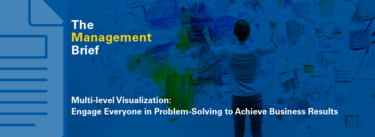“Simple ain’t easy.”
This quote by Thelonious Monk has always struck me as applying to becoming lean. Naturally, Monk was talking about music that is “simple” in its structure and yet so incredibly beautiful that it haunts us after hearing it. Whether it is jazz, classical, or sometimes even popular music, we have all experienced this phenomenon.
When Art Byrne joined The Wiremold Company as its CEO in 1991 he immediately set a new strategy for the company: become one of the top ten time-based competitors in the United States (subsequently changed to “globally”). Now, that’s a pretty cheeky thing for a small ($100 million at the time) electrical products company, tucked away in the northeast corner of the United States, to say. In addition, there was no known metric for “time-based competition,” so how would we ever know if we were among the top ten?
Until that point Wiremold, like many other companies, had been trying to implement “Just-In-Time” as an inventory management tactic…and was failing miserably at it. So much so that between 1987 and 1990 our operating income went down by 82% because of the critical mistakes we made. We intuitively knew that what Toyota was doing was the right thing to do; we just didn’t know why, or how to do it. More importantly, we didn’t understand that “it” (now called lean) is a Strategy…with a capital “S.” Does Toyota call “it” its Strategy? No. They don’t need to. It speaks for itself. They just do it.
Think about it. In his 1980 book Competitive Strategy, Michael Porter defined Strategy as the “…broad formula for how a business is going to compete, what its goals should be, and what policies will be needed to carry out those goals” and the “…combination of the ends (goals) for which the firm is striving and the means (policies) by which it is seeking to get there.”
When Art set our new strategy he said that we, like Toyota, were going to compete on the basis of time. Time has value and competing on that basis will differentiate you from your competition. He also described the “ends” (top ten globally) and the “means” (fix the base business and grow both organically and through selective acquisitions). The details of that Strategy are more fully described in “Wiremold’s New Strategy,” Chapter 2 of Better Thinking, Better Results by Bob Emiliani and his colleagues.
What does being a “time based competitor” mean? Very simply, it means to reduce the time it takes to do everything we do. EVERYTHING. Not just to make the product. Everything we do is done in the context of a process…design new products, plan production, pay people, write computer programs, close the books, etc., etc., etc. And every process contains a mix of activities that “add value”, and activities that don’t. If we can teach our people (through kaizen) how to see and eliminate those activities that don’t add value for our customers, we can deliver our products faster (tomorrow, not six weeks from now), introduce new products faster from concept to launch (months, not years), provide information for decision-making (real time, not historical)…well, just about everything, faster.
When we do that, we free up those resources (people time, machine time, floor space) being consumed by those non-value adding activities, thereby freeing up capacity. And that capacity can be used to grow the business without adding new capacity. In effect, time is the currency of lean. It can be used to “finance” growth. By freeing up this capacity, the only significant added cost of the next “unit” that I sell is its material content. I already have the people, the machines, and the facilities. That is why Toyota is the most productive, the most capital efficient and the most profitable company in the automotive business.
After Lean Thinking was published in 1995, Wiremold began to receive many requests from other companies to visit us in order to “learn” from what we were doing. When they came we were very open about our “strategy,” including the “ends” and “means.” Just like Toyota. Many of our people asked why we were being so open about this, since eventually that information would get back to our competitors. Art’s answer was very straightforward: “It’s so simple that they won’t believe it.”
But those of us that have traveled that road to becoming lean know that, as Monk said, “simple ain’t easy.”





